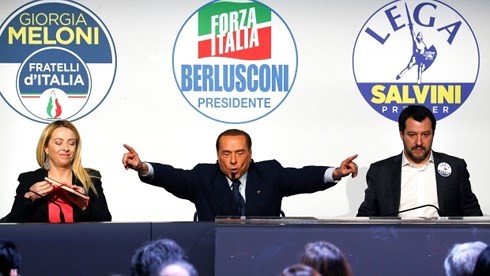(VOVWORLD) - Sunday's election in Italy gave no party a clear majority to form a government. The result of a hung parliament signals a period of political instability in Italy and the European Union.
 Leaders of the central-right political party coalition (photo: CBC) Leaders of the central-right political party coalition (photo: CBC)
|
The centre-right coalition of former Prime Minister Silvio Berlusconi led with 37% of the vote in the lower house chamber of deputies and 37.49% of the upper house. The Five Star Movement (M5S) ran second with 32.67% of the lower house and 32.22% of the upper house. The Democratic Party (PD) came third.
Surge of populism
The election result indicating growing support for populist parties. The M5S and the Lega Nord (LN) won more votes than in any previous election, while support for the traditional political parties – the Democratic Party and Forza Italia – decreased. The strength of populist and extremist parties in Italy is a blow to the European Union.
Populism, which has been smouldering in many European countries, could ignite following Italy’s election. President of the European Parliament Antonio Tajani had called on Italian voters to support the Democratic central-left party, not populist and euroskeptic parties which advocate anti-immigration, like the M5S and the League. Tajani said the EU needs a strong Italy with ideas and policies that benefit the EU. But many Italian voters have expressed a different view by voting for populism.
Some voters said the populist parties made unrealistic promises during the campaign.
What is an appropriate scenario for Italy?
President Sergio Mattarella must find a coalition party to form a government. Investors and European leaders expect a coalition between the right-wing and the central-left Democratic Party. Another possible scenario is a populist and extremist coalition. Previously the M5S and the League rejected the idea of cooperating but the current situation suggests that a coalition could give them a parliamentary majority. This possibility is alarming to Europe because both parties have anti-immigrant and euroskeptic views. The M5S has repeatedly predicted it will become a major force in the parliament.
If the parties can’t cooperate, Italy will have to hold another election. In that case another hung parliament could negatively impact Italy’s economy, which is recovering very slowly. After the 2013 election, it took 2 months for Italy to form a government.
Italy is the 3rd biggest economy of the European Union. Its policies strongly affect the regional economy and European policies. Both Italian leaders and the EU hope an EU-friendly government will be formed.